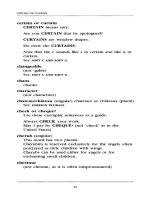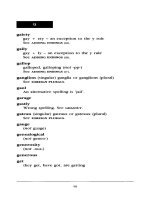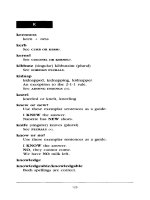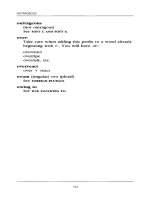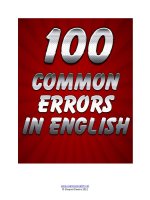common errors in english_2 docx
Bạn đang xem bản rút gọn của tài liệu. Xem và tải ngay bản đầy đủ của tài liệu tại đây (624.49 KB, 27 trang )
-ANCE,-ANT/-ENCE,-ENT
amoung
Wrong
spelling.
See
AMONG.
amount
(not
ammount)
amount
or
number?
AMOUNT
is
used with non-count nouns:
a
small
AMOUNT
of
sugar;
a
surprising
AMOUNT
of
gossip.
NUMBER
is
used with plural nouns:
a
NUMBER
of
mistakes;
a
NUMBER
of
reasons.
analyse
(not
-yze
as in
American English)
analysis
(singular) analyses (plural)
See
FOREIGN
PLURALS.
-ance,-ant/-ence,-ent
Words with these endings
are
difficult
to
spell
and
you'll
always
need
to be on
your guard
with
them.
Check
each
word
individually when
in
doubt,
but
here
are
some
useful
guidelines:
(i)
People
are
generally -ant: attendant, lieutenant,
occupant, sergeant, tenant (but there
are
exceptions like superintendent, president,
resident ).
(ii)
Use
-ance, -ant, where
the
companion word
ends
in
-ation: dominance, dominant,
domination; variance, variant, variation.
(iii)
Use
-ence, -ent
after
qu:
consequence,
consequent;
eloquence,
eloquent.
(iv)
Use
-ance, -ant
after
hard
c or
hard
g:
significance,
significant
(c
sounds like
k);
elegance, elegant
(hard
g).
17
(v)
Use
-ence,
-ent
after soft
c or
soft
g:
innocence,
innocent
(c
sounds like
s);
intelligent, intelligence
(g
sounds like
j).
See
SOFT
c
AND
SOFT
G.
and/but
Many
of us
have been taught never
to
begin
a
sentence
with
AND or
BUT. Generally speaking this
is
good advice. Both words
are
conjunctions
and
will
therefore
be
busy
joining words within
the
sentence:
I
should love
to
come
AND I
look forward
to the
party
very
much.
They
wanted
to
come
BUT
sadly they
had to
visit
a
friend
in
hospital some miles away.
However,
there
are
some occasions when
you may
need
the
extra emphasis that starting
a new
sentence
with
AND or BUT
would give.
If you
have
a
good
reason
to
break
the
rules,
do so!
anecdote
or
antidote?
An
ANECDOTE
is a
short, amusing account
of
something that
has
happened.
An
ANTIDOTE
is a
medicine taken
to
counteract
a
poison.
angsiety
Wrong
spelling.
See
ANXIETY.
angsious
Wrong spelling.
See
ANXIOUS.
annex
or
annexe?
To
ANNEX
is to
take possession
of a
country
or
part
of
a
country.
An
ANNEX
is
another word
for an
appendix
in an
official
document.
An
ANNEXE
is a
building added
to the
main
building.
18
AND/BUT
ANTENNA
annoint
Wrong spelling.
See
ANOINT.
announce
announced, announcing, announcer, announcement
(not
-n-)
annoy
annoyed,
annoying,
annoyance
(not
anoy
or
annoied)
annul
annulled, annulling, annulment
See
ADDING ENDINGS
(iv).
anoint
(not
-nn-)
anounce
Wrong spelling.
See
ANNOUNCE.
anoy
Wrong spelling.
See
ANNOY.
ante-/anti-
ANTE-
means
before,
antenatal
=
before birth
ANTI-
means
against,
antifreeze
=
against
freezing
antecedent
This
means earlier
in
time
or an
ancestor,
(not
anti-)
See
ANTE-/ANTI
antediluvian
This
means very old-fashioned
and
primitive, literally
'before
the flood of
Noah',
(not
anti-)
See
ANTE-/ANTI
antenna
This
word
has two
plurals, each used
in a
different
sense:
Use
ANTENNAE
to
refer
to
insects.
19
ANTICLIMAX
Use
ANTENNAS
to
refer
to
television aerials.
See
FOREIGN PLURALS.
anticlimax
(not
ante-)
See
ANTE-/ANTI
antidote
See
ANECDOTE
OR
ANTIDOTE?.
antirrhinum
(not
-rh-)
antisocial
(not
ante-)
See
ANTE-/ANTI
anxiety
(not
angs-)
anxious
(not
angs-)
apologise/apologize
Both
spellings
are
correct,
(not
-pp)
apology
apologies (plural)
See
PLURALS
(iii).
apon
Wrong spelling.
See
UPON.
apostrophes
(i)
Apostrophes
can be
used
to
show that letters
have been omitted:
in
contractions
didn't
o'clock
you've
won't
20
APOSTROPHES
in
poetry
o'er
vales
and
hills
where'er
you
walk
in
dialect
'Ere's
'Arry.
in
retail
pick
'n' mix
salt
'n'
vinegar
(ii)
Apostrophes
can be
used
to
show ownership.
Follow
these
simple guidelines
and
you'll never
put
the
apostrophe
in the
wrong place.
Singular
nouns
or
'owners'
The
tail
of the dog
The
dog's tail
Who
'owns'
the
tail?
the dog
Put
the
apostrophe
after
the
owner.
the
dog'
Add
-s. the
dog's
Add
what
is
'owned'.
the
dog's
tail
The
smile
of the
princess
The
princess's smile
Who
'owns'
the
smile?
the
princess
Put
the
apostrophe
after
the
owner.
the
princess'
Add
-s. the
princess's
Add
what
is
'owned'.
the
princess's smile
With
proper
names ending
in -s, you
have
a
choice,
depending upon
how the
name
is
pronounced.
Keats'
poetry
or
Keats's
poetry
But St
James's
Square,
London,
SW1
St
James'
(two syllables)
St
James's (three syllables)
21
APPAL
Plural
nouns
or
'owners'
Don't worry about whether
you use 's or s' in the
plural.
It
will sort
itself
out.
The
tails
of the
dogs
The
dogs' tails
Who
'owns'
the
tails?
the
dogs
Put
the
apostrophe
after
the
owners.
the
dogs'
Add
-s if
there isn't one.
(no
need here)
Add
what
is
'owned'.
the
dogs' tails
The
laughter
of the
women
The
women's laughter
Who
'owns'
the
laughter?
the
women
Put
the
apostrophe
after
the
owners.
the
women'
Add
-s if
there isn't one.
the
women's
Add
what
is
'owned'.
the
women's laughter
And
so,
when reading,
you
will
be
able
to
distinguish
singular
and
plural
'owners'.
The
princess's
suitors.
The
princesses' suitors.
The
'owner'
is the
word before
the
apostrophe.
(iii)
Apostrophes
are
also used
in
condensed
expressions
of
time.
The
work
of a
moment.
A
moment's work.
The
work
of
three years.
Three years' work.
If
you
follow
the
guidelines
in
(ii) above,
you
will never make
a
mistake.
appal
appalled, appalling (not
-aul-)
See
also
ADDING ENDINGS
(iv).
22
appearance
(not
-ence)
appendix
This
word
has two
plurals, each used
in a
different
sense.
Use
APPENDIXES
in an
anatomical sense.
Use
APPENDICES
when referring
to
supplementary
sections
in
books
or
formal documents.
See
also
FOREIGN PLURALS.
appologiseMze
Wrong spelling.
See
APOLOGISE/APOLOGIZE.
appology
Wrong
spelling.
See
APOLOGY.
appraise
or
apprise?
To
APPRAISE
is to
evaluate.
To
APPRISE
is to
inform.
appreciate
There
are
three distinct meanings
of
this
word.
I
APPRECIATE
your
kindness
(=
recognise
gratefully).
I
APPRECIATE
that
you
have
had a
difficult
time
lately
(=
understand).
My
cottage
HAS
APPRECIATED
in
value already
(=
increased).
Some
people
would choose
to
avoid
the
second
use
above (understand, realise)
but the
verb
is now
widely used
in
this sense
and
this
has
become
acceptable.
approach
approached, approaching
(not apr-)
aquaint
Wrong
spelling.
See
ACQUAINT.
23
AOUAINT
AQUAINTANCE
aquaintance
Wrong spelling.
See
ACQUAINTANCE.
aquarium
(singular) aquaria
or
aquariums (plural)
See
FOREIGN PLURALS.
aquiesce
Wrong spelling.
See
ACQUIESCE.
aquiescence
Wrong spelling.
See
ACQUIESCENCE.
aquire
Wrong spelling.
See
ACQUIRE.
arange
Wrong spelling.
See
ARRANGE.
arbiter
or
arbitrator?
An
ARBITER
is a
judge
or
someone with decisive
influence
(an
arbiter
of
fashion).
In
addition,
an
ARBITER
may
intervene
to
settle
a
dispute (-er).
An
ARBITRATOR
is
someone
who is
officially
appointed
to
judge
the
rights
and
wrongs
of a
dispute
(-or).
arbitrator
or
mediator?
An
ARBITRATOR
reaches
a
judgement
but is not
necessarily obeyed.
A
MEDIATOR
attempts
to
bring
two
opposing sides
together
and to
settle
a
dispute.
archipelago
There
are two
interchangeable plural forms:
archipelagoes, archipelagos.
arctic
(not
artic, although frequently mispronounced
as
such)
24
argument
(not
arguement)
arrange
arranged, arranging, arrangement (not -r-)
See
ADDING ENDINGS (ii).
artefact
American:
artifact
artic
Wrong spelling.
See
ARCTIC.
article
(not
-cal)
See
-CAL/-CLE.
artist
or
artiste?
Traditionally,
an
ARTIST
is
skilled
in one or
more
of
the fine
arts (painting,
for
example,
or
sculpture).
Traditionally,
the
term
ARTISTE
is
reserved
for a
performer
or
entertainer
(a
music-hall
ARTISTE).
However,
ARTIST
is now
being used
to
cover both
meanings
in the
sense
of
'skilled
practitioner',
and
ARTISTE
is
becoming redundant.
as or
like?
Use
these exemplar sentences
as a
guide:
You
look
AS if you
have seen
a
ghost.
You
look
AS
though
you
have seen
a
ghost.
AS
I
expected, he's missed
the
train.
You
look
LIKE
your mother.
asma
Wrong
spelling.
See
ASTHMA.
asphalt
(not
ashphalt,
as it is
frequently mispronounced)
aspirin
(not
asprin,
as it is
frequently
mispronounced)
25
ASPIRIN
assassin
(not
assasin
or
asassin)
assma
Wrong spelling.
See
ASTHMA.
assume
or
presume?
To
ASSUME
something
to be the
case
is to
take
it
for
granted without
any
proof.
To
PRESUME
something
to be the
case
is to
base
it
on the
evidence
available.
assurance
or
insurance?
Insurance companies distinguish
between
these
two
terms.
ASSURANCE
is the
technical term given
for
insurance against
a
certainty
(e.g.
death)
where
payment
is
guaranteed.
INSURANCE
is the
technical term given
for
insurance against
a
risk (such
as fire,
burglary, illness)
where payment
is
made only
if the
risk materialises.
asthma
(not
asma
or
assma)
astrology
or
astronomy?
ASTROLOGY
is the
study
of the
influence
of the
stars
and
planets
on
human
life
and
fortune.
ASTRONOMY
is the
scientific study
of the
stars
and
planets.
athlete
(not athelete)
athletics
(not
atheletics)
attach
attached, attaching, attachment
(not -tch)
audible
(not
-able)
26
ASSASSIN
AXIS
audience
(not
-ance)
aural
or
oral?
AURAL
refers
to the
ears
and
hearing.
ORAL
refers
to the
mouth
and
speaking.
In
speech these words
can be
very confusing
as
they
are
pronounced identically.
authoritative
(not
authorative)
autobiography
or
biography?
An
AUTOBIOGRAPHY
is an
account
of his or her
life
by the
author.
A
BIOGRAPHY
is an
account
of a
life
written
by
someone else.
automaton
(singular) automata, automatons (plural)
See
FOREIGN PLURALS.
avenge
or
revenge?
The
words
are
very close
in
meaning
but
AVENGE
is
often
used
in the
sense
of
exacting
just
retribution,
punishing
a
wrong done
to
another.
Hamlet
felt
bound
to
AVENGE
his
father's death.
REVENGE
is
often
used
in the
sense
of
'getting
one's
own
back'
for a
petty
offence.
averse
See
ADVERSE
or
AVERSE?.
awkward
Notice -wkw
The
spelling itself looks awkward!
axis
(singular) axes (plural)
See
FOREIGN PLURALS.
27
babyhood
(not
-i-)
This
word
is an
exception
to the -y
rule.
See
ADDING ENDINGS
(iii).
bachelor
(not
-tch-)
bacillus
(singular) bacilli (plural)
See
FOREIGN PLURALS.
bacterium
(singular) bacteria (plural)
See
FOREIGN PLURALS.
badly
This
word
is
often carelessly positioned with
disastrous
effects
on
meaning.
See
AMBIGUITY (iii).
banister/bannister
banisters, bannisters (plural)
Although
the first
spelling
is
more widely used, both
spellings
are
correct.
bargain
(not
-ian)
basically
basic
+
ally (not basicly)
batchelor
Wrong spelling.
See
BACHELOR.
bath
or
bathe?
Use
these exemplar sentences
as a
guide:
I
have
a
BATH every morning
(=
I
have
a
wash
in
the
bath).
I
BATH
the
baby every
day
(=
wash
in a
bath).
I
have
had a new
BATH
fitted.
28
ia
BENEFIT
We
BATHE
every
day
(=
swim).
BATHE
the
wound with disinfectant
(=
cleanse).
We
have
a
BATHE
whenever
we can (= a
swim).
beach
or
beech?
Use
these exemplar sentences
as a
guide:
Budleigh
Salterton
has a
stony
BEACH.
BEECH
trees retain their leaves
in
autumn.
beautiful
Use
your knowledge
of
French beau
to
help
you.
before
(not
befor)
begin
Note these forms
and
spellings:
I
begin,
I am
beginning.
I
began,
I
have begun.
beginner
(not
-n-)
beige
(not
-ie-)
See
EI/IE
SPELLING RULE.
belief
(not
-ei)
See
EI/IE SPELLING RULE.
believe
believed, believing, believer
See
EI/IE SPELLING RULE.
See
ADDING ENDINGS
(ii).
benefit
benefited,
benefiting
It
is a
common mistake
to use
-tt
29
BERTH
OR
BIRTH?
berth
or
birth?
Use
these
exemplar
sentences
as a
guide:
We
have
a
spare
BERTH
on our
boat.
We
are
proud
to
announce
the
BIRTH
of a
daughter.
beside
or
besides?
Use
BESIDE
in the
sense
of
next
to, by the
side
of:
Your
glasses
are
BESIDE
your bed.
May
I sit
BESIDE
you?
Use
BESIDES
in the
sense
of
also,
as
well
as:
BESIDES,
I
can't
afford
it.
BESIDES
being very clever,
Ann
also works hard.
between
See
AMONG
OR
BETWEEN?.
between
you and I
Incorrect. Write: between
you and me.
See
PREPOSITIONS.
bi-
This
prefix means
'two'.
Hence bicycle
bifocals
bigamy,
and so on.
Note,
however, that some words beginning with
'bi'
can
be
ambiguous.
See
BIMONTHLY
and
BIWEEKLY.
See
also
BIANNUAL
OR
BIENNIAL?.
biannual
or
biennial?
BIANNUAL
means twice
a
year (not -n-).
BIENNIAL
means every
two
years
(a
biennial
festival)
or
taking
two
years
to
grow
(horticultural,
etc),
(not
-ual)
30
BIWEEKLY
bicycle
bi +
cycle
(not
bycycle
or
bycicle)
bidding
or
biding?
bid + ing =
bidding
The
BIDDING
at the
auction
was
fast
and
furious.
BIDDING farewell,
the
knight
cantered
away.
bide
+ ing =
biding
Her
critics
were
just
BIDING their time.
See
ADDING ENDINGS
(i) and
(ii).
biege
Wrong spelling.
See
BEIGE.
biennial
See
BIANNUAL
OR
BIENNIAL?.
bimonthly
Avoid
using
BIMONTHLY
as it has two
conflicting
meanings.
It can
mean both every
two
months
and
also twice
a
month. (Compare
BIWEEKLY.)
binoculars
(not
-nn-)
biography
See
AUTOBIOGRAPHY
OR
BIOGRAPHY?.
biscuit
(not
-iu-)
biulding
Wrong spelling.
See
BUILDING.
bivouac
bivouacked, bivouacking
See
SOFT
c AND
SOFT
G.
biweekly
This
word
has two
conflicting meanings
and is
31
perhaps best avoided.
It can
mean both every
two
weeks (i.e.
fortnightly)
and
also twice
a
week.
(Compare
BIMONTHLY.)
bizarre
(not
-22-)
blond
or
blonde?
BLOND
is
used
to
describe men's hair.
BLOND/BLONDE
is
used
to
describe women's hair.
A
BLONDE
is a
woman.
board
or
bored?
A
BOARD
is a
piece
of
wood,
also
a
committee
or
similar
group
of
people.
To
BOARD
means
to get on
(train, etc.)
and
also
to
pay for
living
in
someone's house
and
having food
provided.
BORED
means uninterested.
boarder
or
border?
A
BOARDER
is a
person
who
pays
to
live
in
someone's house
or
school.
A
BORDER
is the
edge
or
boundary
of
something.
boisterous
syllables)
boney/bony
Both
spellings
are
correct, although
the
second
spelling
is
more commonly used.
border
See
BOARDER
OR
BORDER?.
bored
See
BOARD
OR
BORED?.
bored
by,
bored
with
(not
bored
or)
32
BIZARRE
(not boistrous, although often mispronounced as two
BOUGHT
OR
BROUGHT?
born
or
borne?
Use
these exemplar sentences
as a
guide:
Dickens
was
BORN
in
Portsmouth.
She
has
BORNE
five
children.
He
has
BORNE
a
heavy burden
of
guilt
all his
life.
borrow
or
lend?
May
I
BORROW
your pen?
(=
use
your
pen
temporarily)
Please
LEND
me
your pen.
(=
pass
it to me and
allow
me to use it)
both
and
Take care with
the
positioning
of
each half
of
this
paired construction.
Each
must introduce
grammatically
similar things:
He
is
BOTH clever
AND
hardworking.
(not:
He
both
is
clever
and
hardworking!)
He
BOTH paints
AND
sculpts.
He
bought BOTH
the
gardening tools
AND the
DIY
kit.
Notice,
however,
the
ambiguity
in the
last example.
It
could mean that there
were
just
two
gardening
tools
and he
bought both
of
them.
In the
case
of
possible confusion, always replace:
He
bought
the
gardening tools
and
also
the DIY
kit.
He
bought
the two
gardening tools
and
also
the DIY
kit.
He
bought
both
of the
gardening
tools
and
also
the
DIY
kit.
bought
or
brought?
BOUGHT
is the
past tense
of to
buy.
She
BOUGHT eggs, bacon
and
bread.
BROUGHT
is the
past tense
of to
bring.
33
They
BROUGHT
their books
home.
bouncy
(not
-ey)
See
ADDING ENDINGS (ii).
brackets
Round
brackets enclose additional information which
the
writer wants
to
keep separate
from
the
main
body
of the
sentence.
Jane
Austen
(born
in
1775) died
in
Winchester.
My
neighbour (have
you met
her?)
has won
£250,000.
Notice
how
sentences
in
brackets
are not
fully
punctuated.
They
don't
begin with
a
capital letter
or
have
a
full
stop
at the end if
they occur within another
sentence
as in the
example above. They
do,
however, have
a
question mark
or an
exclamation
mark,
if
appropriate.
Square
brackets indicate that
the
material
has
been
added
to the
original
by
another writer:
When
I
[Hilaire
Belloc]
am
dead,
I
hope
it may be
said:
'His
sins were scarlet,
but his
books
were
read.'
breath
or
breathe?
BREATH
is the
noun,
and
rhymes with
'death'.
He
called
for
help with
his
dying
BREATH.
BREATHE
is the
verb
and
rhymes with
'seethe'.
BREATHE
deeply
and fill
those
lungs!
brief,
briefly
(not
-ei-)
Britain
(not
-ian)
34
BOUNCY
BUT
Brittany
(not
Britanny)
broach
or
brooch?
You
BROACH
a
difficult
topic
or
BROACH
a
bottle.
You
wear
a
BROOCH.
broccoli
(not
brocolli)
broken
(not
brocken)
brought
See
BOUGHT
OR
BROUGHT?.
buffalo (singular)
buffalo,
buffaloes
(plural)
See
PLURALS (iv).
building
(not -iu-)
buisness
Wrong spelling.
See
BUSINESS.
bureau
bureaux, bureaus (plural)
Both forms
are
correct.
See
FOREIGN PLURALS.
bureaucracy
(not -sy)
burglar
(not burgular,
as
often
mispronounced)
burned/burnt
Both forms
are
correct.
business
(not buisness)
but
See
AND/BUT.
35
buy/by
Use
these exemplar sentences
as a
guide:
I
need
to BUY
some
new
jeans.
The
book
is BY
Charlotte Bronte.
Wait
BY the
gate.
The
children rushed
BY.
36
BUY/BY
cactus
(singular) cactuses
or
cacti (plural)
See
FOREIGN
PLURALS.
caffeine
(not
-ie-)
-cal/-cle
Adjectives
end in
-cal.
Nouns
end in
-cle.
e.g. critical
logical
magical
musical
nautical
physical
practical
theatrical
tropical
whimsical
calculator
(not
-er)
calendar
article
bicycle
circle
cubicle
cuticle
miracle
particle
spectacle
uncle
vehicle
calf
(singular) calves (plural)
See
PLURALS
(v).
callous
or
callus?
CALLOUS
means cruel, insensitive,
not
caring
about
how
others
feel.
CALLUS
means
a
hard patch
of
skin
or
tissue.
Interestingly,
skin
may be
CALLOUSED
(made
hard)
or
CALLUSED
(having calluses).
can or
may?
Strictly
speaking,
CAN
means
'being
able'
and MAY
means
'having
permission'.
It is
best
to
preserve this
37
H
CANING
OR
CANNING?
distinction
in
formal
contexts. However, informally,
CAN
is
used
to
cover both meanings:
You
CAN go now
(=
are
permitted).
caning
or
canning?
cane
+ ing =
caning
CANING
is now
banned
in all
schools.
Can + ing =
canning
The
CANNING
factory
is
closing down.
See
ADDING ENDINGS
(i) and
(ii).
canister
(not
-nn-)
cannon
or
canon?
A
CANON
is a
cleric.
A
CANNON
is a
large gun.
cannot
or can
not?
Both
forms
are
acceptable
but the
second
is
rarely
seen.
canoe
canoed, canoeing, canoeist
See
ADDING ENDINGS (ii).
canon
See
CANNON
OR
CANON?.
can't
Contraction
of
CANNOT.
canvas
or
canvass?
CANVAS
is a
rough
cloth.
To
CANVASS
is to ask for
votes.
capital
letters
Use
a
capital letter
in
these circumstances:
to
begin
a
sentence:
38
CAPITAL
LETTERS
My
father
will
be fifty
tomorrow,
to
begin sentences
of
direct speech:
'You
will
be
sorry
for
this
in the
morning,'
she
said.
She
said,
'You
will
be
sorry
for
this
in the
morning.
You
never
learn.'
for
the
pronoun
T
wherever
it
comes
in the
sentence:
You
know that
I
have
no
money,
for
all
proper
nouns
-
names
of:
people
(Mary
Browne)
countries
(Malta)
languages
(French)
religious
festivals
(Easter,
Diwali)
firms
(Express
Cleaners)
organisations (the British Broadcasting
Corporation)
historical periods (the Renaissance)
(the
Neolithic Period)
days
of the
week (Monday)
months
of the
year (September)
but
not
usually
the
seasons
Note
these adjectives derived
from
proper nouns also
have
a
capital letter:
a
Jewish
festival;
a
German poet
However,
the
capital
is
dropped
when
the
connection with
the
proper noun becomes lost:
Venetian
blinds,
french
windows
Note
also that titles
are
capitalised only when part
of
a
proper noun:
Bishop
Christopher Budd, otherwise
the
bishop
Aunt
Gladys, otherwise
my
aunt
39
CAPITAL
LETTERS
Captain
Llewellyn, otherwise
the
captain
to
begin lines
of
poetry (although some poets
like e.e. cummings
dispense
with
this
convention)
to
mark
the first
word
and the
subsequent
key
words
in
titles:
The
Taming
of the
Shrew
An
Old
Wives' Tale
for
emphasis:
And
then
-
BANG!
for
some acronyms
and
initialisms:
NATO
UNESCO
CAFOD
OXFAM
PTO
RSVP
Note
that some acronyms have
now
become
words
in
their
own
right
and are no
longer
written
in
capitals: laser, sauna, radar.
Note also that some initialisms
are
usually
written
in
lower case: i.e., e.g., c/o, wpm.
for
the
Deity
as a
mark
of
respect
and for
sacred
books:
God,
Jesus Christ,
the
Holy Spirit,
the
Almighty,
Allah,
Jehovah,
Yahweh
the
Bible,
the
Koran,
the
Vedas
to
begin each
word
in an
address:
Mrs
Anna
Sendall
10
Furze Crescent
ALPHINGTON
Hants
PD6 9EF
40
CARRYING
for
the
salutation
in a
letter
(first
word
and key
words
only)
and for the first
letter
of the
complimentary close:
Dear
Sir
Dear
Mrs
Hughes
My
dear niece
Yours
faithfully
Yours
sincerely
With much love
With best wishes
capital
punishment
or
corporal
punishment?
CAPITAL
PUNISHMENT
=
death
CORPORAL
PUNISHMENT
=
beating
cappuccino
(not -p-)
capsize
This
is the
only verb
in the
English language
of
more
than
one
syllable that
must
end in
-ize.
captain
(not -ian)
capuccino
Wrong spelling.
See
CAPPUCCINO.
career
(not -rr-)
cargo
(singular) cargoes (plural)
See
PLURALS (iv).
Caribbean
(not
-rr-,
not
-b-)
carreer
Wrong spelling.
See
CAREER.
carrying
carry
+ ing
41
t





